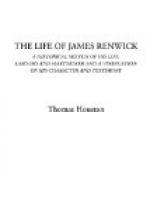The grand principle of the rejection of tyrannical power was boldly proclaimed by Cargill, in preaching to thousands of Conventicle hearers, and was prominently held forth in his last testimony:—“As to the cause of my suffering,” said he, “the chief is, not acknowledging the present authority, as it is established in the supremacy and explanatory act. This is the magistracy I have rejected—that which is invested with Christ’s power. Seeing that power taken from Christ which is His glory, and made the essential of an earthly crown, seemed to me, as if one were wearing my husband’s garments, after he had killed him. There is no distinction we can make that can free the conscience of the acknowledger from being a partaker of this sacrilegious robbery of God. And it is but to cheat our conscience to acknowledge the civil power alone, that it is of the essence of the crown; and seeing they are so express, we ought to be plain, for otherwise we deny our testimony, and consent that Christ be robbed of His glory.”
The same testimony against the Indulgence and against unconstitutional power was firmly maintained by RICHARD CAMERON, during the whole of his public ministry, and in the noble testimony emitted by him shortly before his death. Soon after his return from Holland in 1680, in one of his earliest sermons, he declared, “I know not if this generation will be honoured to cast off these rulers. But those that the Lord makes instruments to bring back Christ, and to recover our liberties, civil and ecclesiastical, shall be such as shall disown this king and the magistrates under him.” He added this warning to the persecuting authorities, with the heroic resolve—“Let them take heed unto themselves; for though they should take us to scaffolds, and kill us in the fields, the Lord will yet raise up a party who will be avenged on them. We had rather die than live in the same country with them, and outlive the glory of God departing altogether from these lands.”
A short month before his death, the intrepid Cameron, his brother Michael, and some twenty other covenanters, armed and on horseback, posted up at the market cross of the burgh of SANQUHAR, the “Sanquhar Declaration” in which are contained these ever memorable words:—
“We do, by these presents, disown Charles Stuart, who has been reigning, or rather tyrannizing in the throne of Britain, these years bygone, as having any right, title to, or right in the crown of Scotland, for government:—as forfeited several years since, by his perjury, and breach of Covenant both to God and His truth, and by his tyranny and breach of the very leges regnandi—the very essential conditions of government, in matters civil.” This was a noble deed, and ranks Cameron and his followers with the purest and most disinterested patriots of any age or country. It has been justly remarked by an eloquent writer, “The real matter of fact for which the Cameronians contended was just the old claim of the Covenanters—’a free Parliament and a free Assembly.’” “It is the glory of the Cameronians, in which no other party shares, that when most people lay prostrate, and many of the bravest stood aloof, they were the first to hoist the flag, disowning the government of the Stuarts, without whose expulsion liberty was impossible."[4]




